Painting a Mystery
This week is about painting a mystery and entering another world through art-making. My paintings are in an art journal and made with a loose touch.

It All Started from a Withering Bouquet
“The Midsummer bouquet has withered. I have to throw it in the trash,” I said. “But the setting is just like those old masters’ paintings,” my husband replied unexpectedly. And so I remembered this once again.

Once Upon a Time
Once upon a time, there was
and there still is a world that you can get to from anywhere.
At first, it’s dark, but you can hear a woman reading a letter to someone.

You hear a clock ticking backwards, generating more time.

Then you know that it’s time to take a brush in your hand.

Squeeze the handle firmly and hear the trees moaning as their trunks slowly sink to the ground.
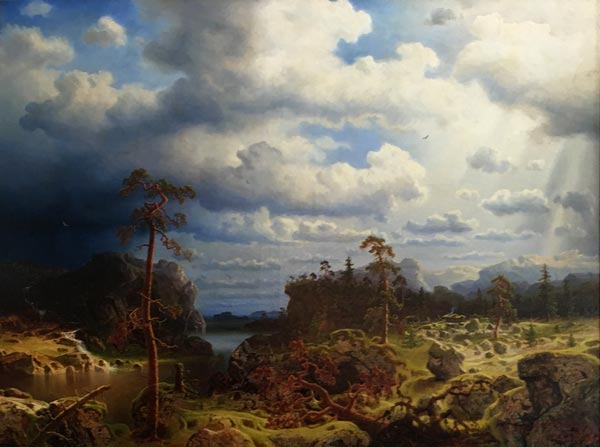
First, it feels silly to paint because there’s nothing to see.

But the darkness gradually disappears, and you realize that you are not alone.

Those strange creatures are all familiar to each other and, in a strange way, to you too.

In this world, everything has been mixed up.
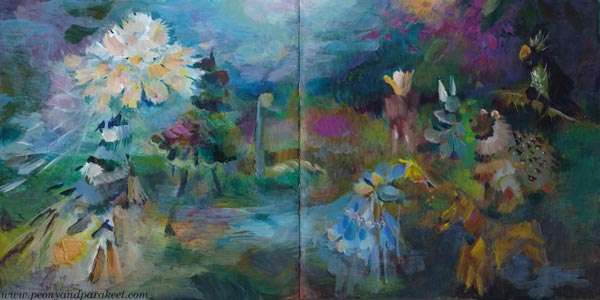
You are the wind that shook the flower, and in blowing the petals back, you lost your soul to it.

You are the chair for which the imagination built a room to rest.

In this world, everything is unfinished. But if you are willing to hear and feel instead of only seeing what’s expected, everything is ready enough.

Painting a Mystery – Background Story
The idea of this blog post came from that short conversation with my husband. Then I had to take a photo of the bouquet and make it in the style of old masters.
After that, I remembered taking a photo of a painting called “Woman Reading and a Man Seated at a Table” at the exhibition of the H’Art Museum in Amsterdam. The painting is by Frans van Mieris from 1676.
While browsing my image archive, I was drawn by another photo, taken in the same trip to Amsterdam. It was a decorative mantel clock from 1782 in the Rijksmuseum.
The clock took my thoughts to a more recent visit in Porvoo, Finland, where my husband and I went to see Johan Ludvig Runeberg‘s home. The lovely interior was from the 1860s, and there was a big painting that I really liked. I took a photo, but haven’t succeeded in finding out who painted it.
After gathering the photos, I picked up my art journal (Dylusions Creative Journal Square) and started painting. I didn’t copy the photos, but let them soak in freely. I was just inspired by the atmosphere they evoked in me.
Hopefully this blog post inspires you to paint freely without strict plans and definitions. Painting a mystery is both fun and addicting – I am already eager to create more!
Painting Small Wildflowers
This week, we explore the beauty of small wildflowers and find what we can learn from nature when painting them.

>> See more pics at the Taiko Online Art Store!
I had a small blank canvas that I wanted to paint on before Midsummer. I did it with acrylic instead of oil because acrylic paint dries faster and you don’t have to wait days for the layers to dry.
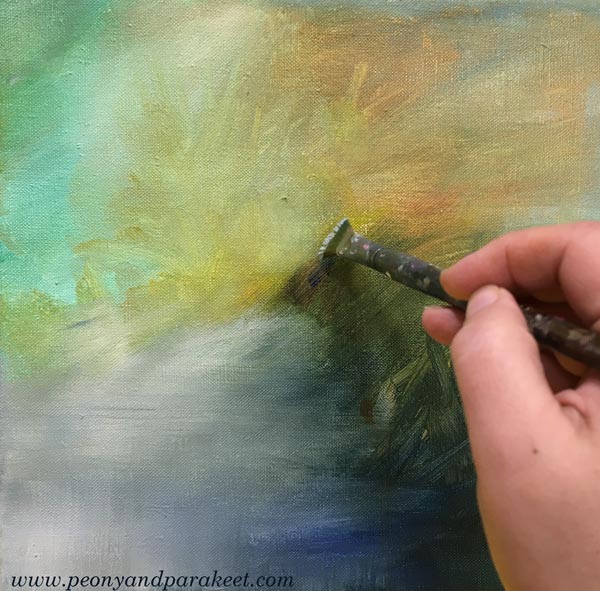
My idea was simple: wood geraniums – or do you call them cranesbills? In Finnish the plant is called “metsäkurjenpolvi” and they bloom everywhere now in June. We have them in our garden too, but I mostly study them on morning walks. As a child, they were my favorite flowers when it comes to wild flowers.

Even if I sometimes take photos of small wildflowers, I don’t want to paint from reference pictures, but freely. I can check the structure and shapes of flowers or leaves from photos, but if I start copying the exact detail, my expression stiffens. It’s like my head begins to ignore my heart, and that’s never good for art-making.
Starting with Big Brushes
At the beginning of the painting process, I don’t even know exactly what I want to express. The mood of the painting grows little by little and when I start, I’m clumsy and quite careless.
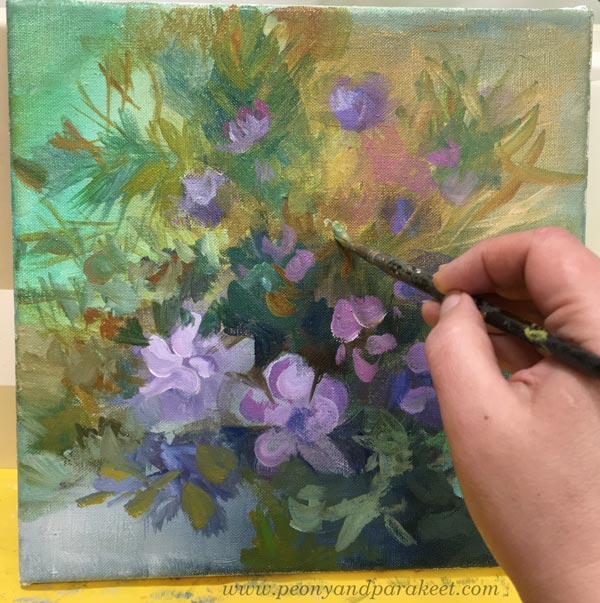
It’s actually pretty quick to make a nice little flower painting if you only think about one plant and don’t aim for anything else. But these days, I don’t want to leave any painting at that level. I want to offer more to look at and combine many observations in the same painting.
Here’s my painting from Day 1 to Day 2. The right lower corner didn’t change much, but the center and the right upper corner changed a lot. And the painting became more detailed.

Some paintings are great with the more abstract and loose touch. But here, I wanted to express the delicacy of small wildflowers and honor their tiny details. I also wanted to make the painting look more natural.
Beautiful Mess with Thin Strokes
Nature is wild and messy. We easily overlook that beautiful mess when we look at wildflowers in a meadow. Our eyes pick out our favorite flowers, and we don’t see all the other plants that are trying to get in the way. Grasses come to the front of the flowers and intersect everywhere. There are endless layers of plants if you look at the view as accurately as possible. Even when looking at this photo, did you notice all that layering?

It seems contradictory that the more romantic and spiritual I want to paint, the more I have to open my eyes to the reality. I need to paint those hays over the pretty wildflowers and let the nature make a beautiful mess in the canvas too.

Small Doses of Conflicting Colors for Flavor
In nature, the colors also get mixed with each other, and there are reflections and conflicting tones. So, even if the number of colors in the painting is limited, you always have to find a small dose of some different tone to spice it up. For example, add some bright red to make the purple flowers delicious! Similarly, cold greens need brownish tones.

In Finland, Midsummer is a big celebration. The nights are white now in the end of June and you can admire the flowers without going to sleep at all.

Paint abstract florals in acrylics with me: >> Buy Floral Freedom!
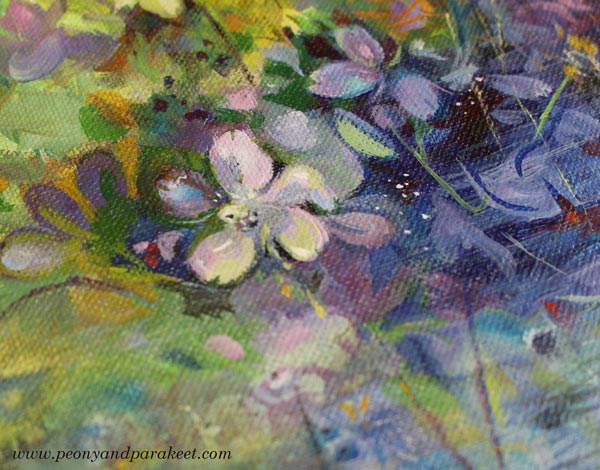
With these pictures, I wish you a wonderful Midsummer and lots of joy in observing and painting tiny treasures – small wildflowers!

Painting small wildflowers – Could this be your next art project?
Black Art Journal Pages as Banners
I want my Black Friday campaigns to be inspiring for art-making, and this year my theme is “Black Berry Friday.” It means juicy art journal pages on black paper. I am pretty sure you have one like my black and square Dylusions Creative Journal (affiliate link).
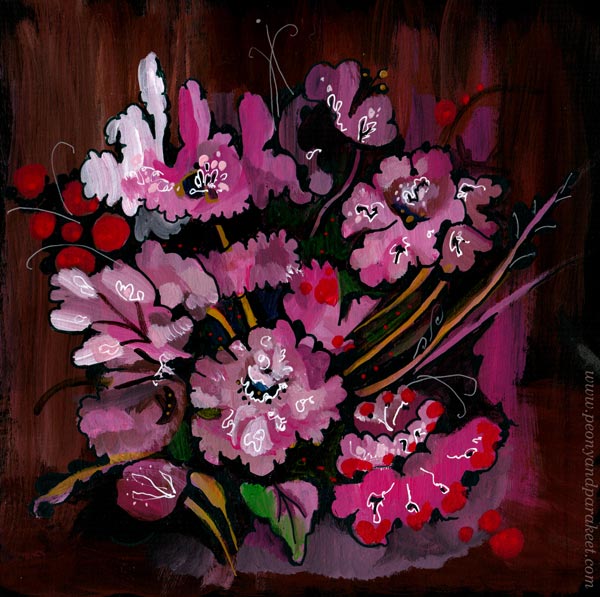
I use my black art journal for using up old supplies that don’t inspire me anymore. And if I have leftover paint on a palette, I make a few brush strokes on a page rather than toss the paint away. This floral page was born from those kinds of careless strokes and now, much later, I finished it with paint markers.
Edges and Banners
Usually, the center of the page is the most important area, but for banners, the edges need to draw attention. Here, the circular floral design, enhances the center text area beautifully.
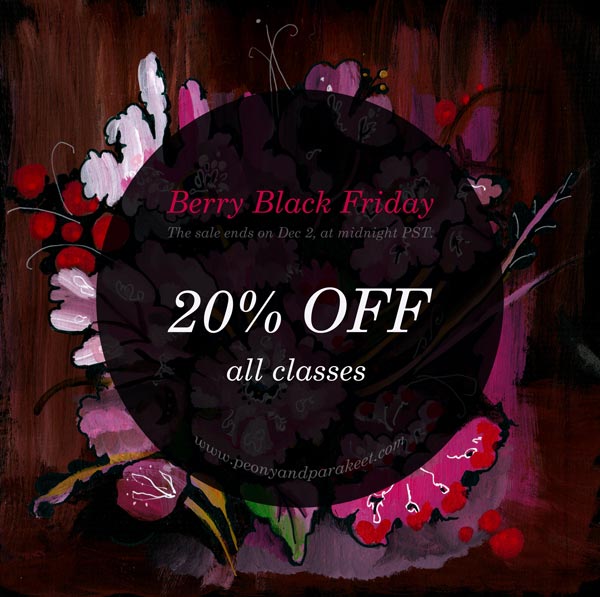
I made the banner in Photoshop, and boosted the colors a bit.
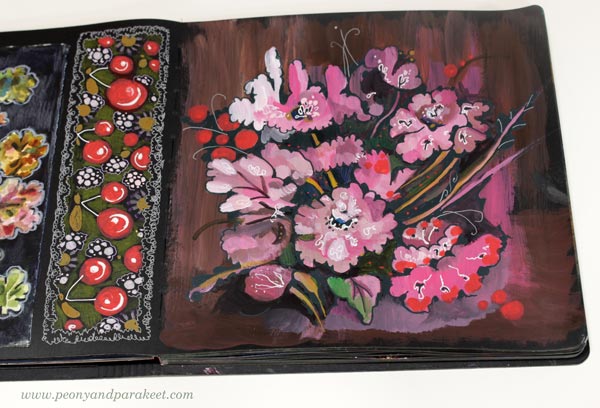
I also drew a long rectangle of cherries that not only makes a great banner but also looks great on the journal. I think we treat art journal pages too often as one unit when a page could be divided in sections and thus bring more variation to the journal.

My banner wasn’t long enough for all the purposes, so I made it longer by duplicating the design in Photoshop.

Colored Pencils on Black Art Journal Pages
I like to use colored pencils with paint markers. Marker pens produce thick and opaque shapes but colored pencils are softer and more translucent. Colored pencils are great for backgrounds. Look at these stripes!
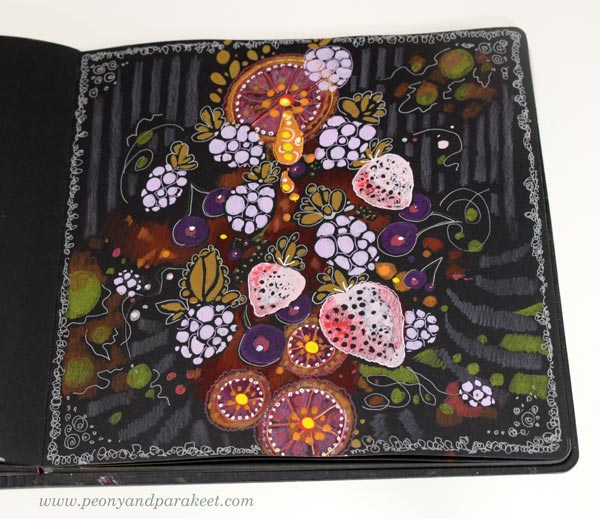
I also used gel pens to add thin lines.
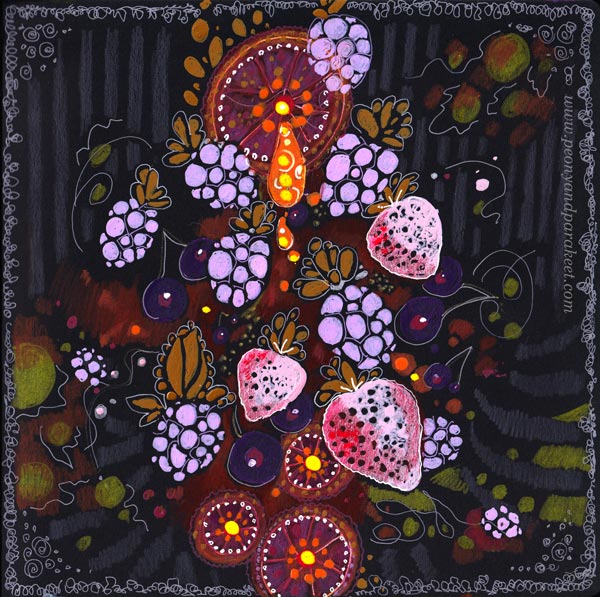
Again, I became more interested in the background than the center. The center is not very elegant, but here, in the banner you mostly see the edges.
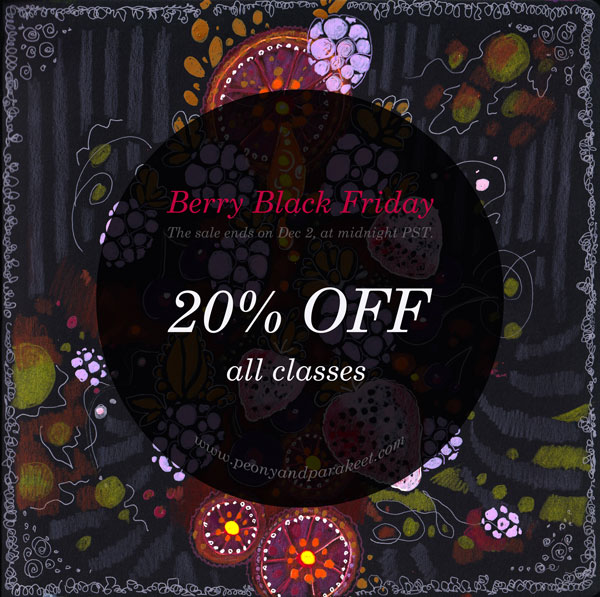
Doodling on Black Art Journal Pages
My Black Friday offer is simple: All classes are 20% OFF. So I wanted the banners have some simplicity too. Doodling circles is easy and doesn’t require much thinking.
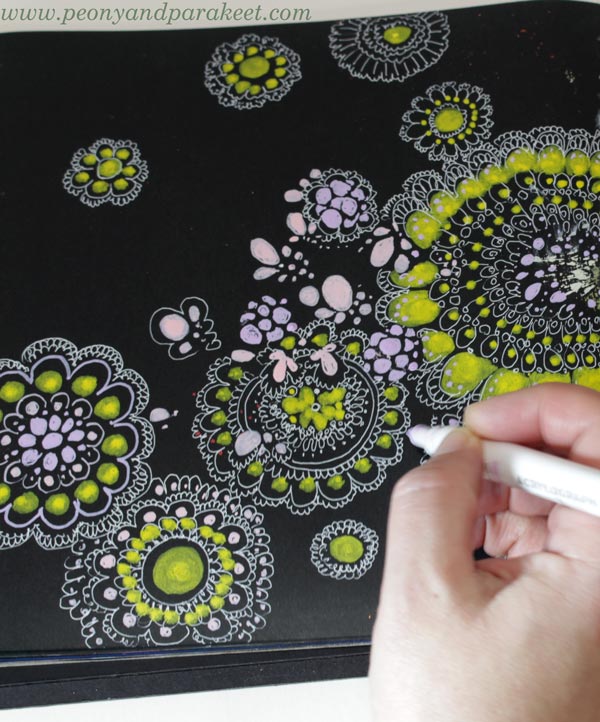
I got a bit carried away though!
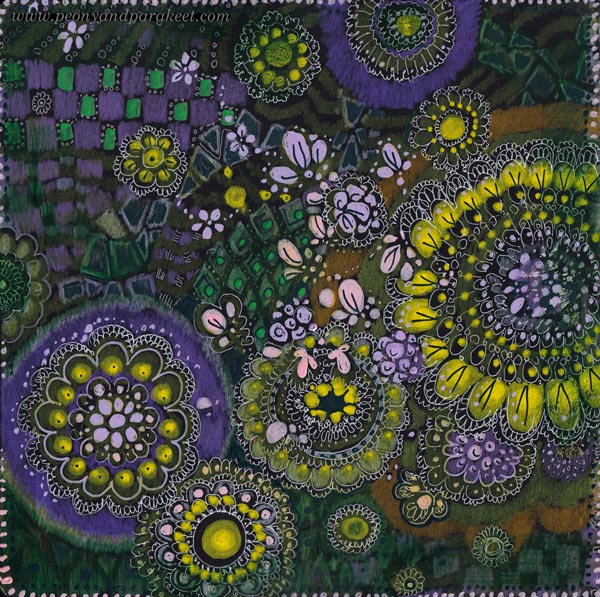
I was talking on the phone and watching a movie while doodling, and once I stopped, I thought that I doodled too much. But the banner looks great and of course, there can’t be too much of anything in art!
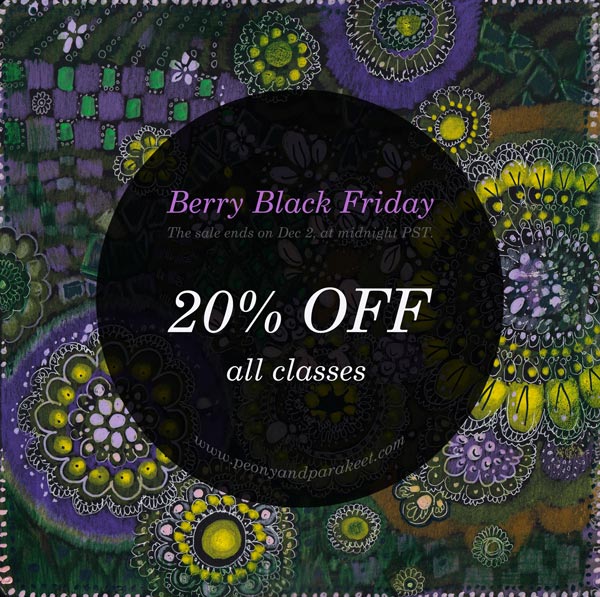
Designs for Fabric
I got so inspired making these pages, that I had to play with Photoshop a bit more than necessary. I combined many pages into one design and I think something like this would make a great fabric.
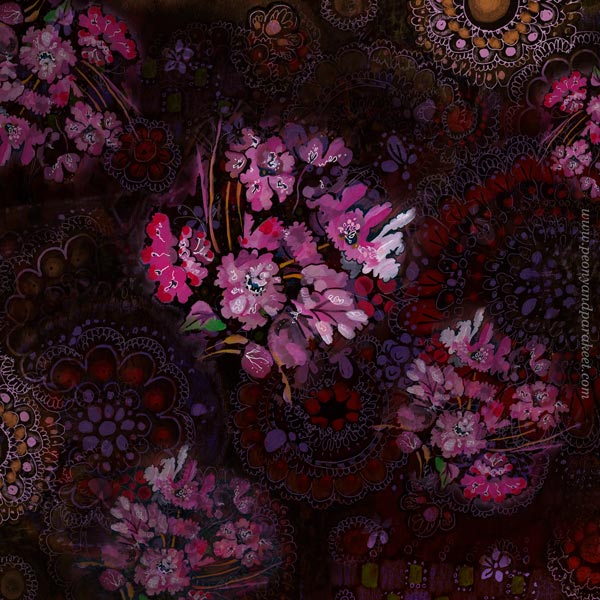
Black Over Painted Background
I have been contemplating whether I should use both sides of the pages on my black art journal. Using only one side would give a blank page to protect the art on the opposite page. But the journal looks much more inspiring when both pages are covered!
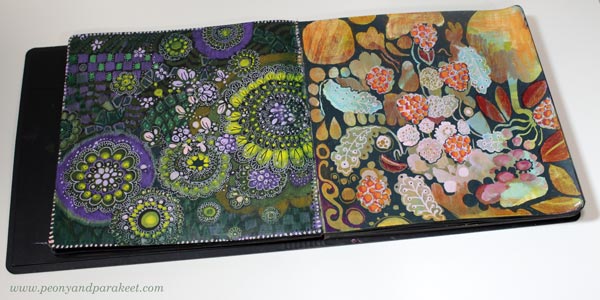
Here’s one more idea for an art journal page, and this works on any journal. When you have painted backgrounds, use dark marker or paint on top to make shapes from the background.
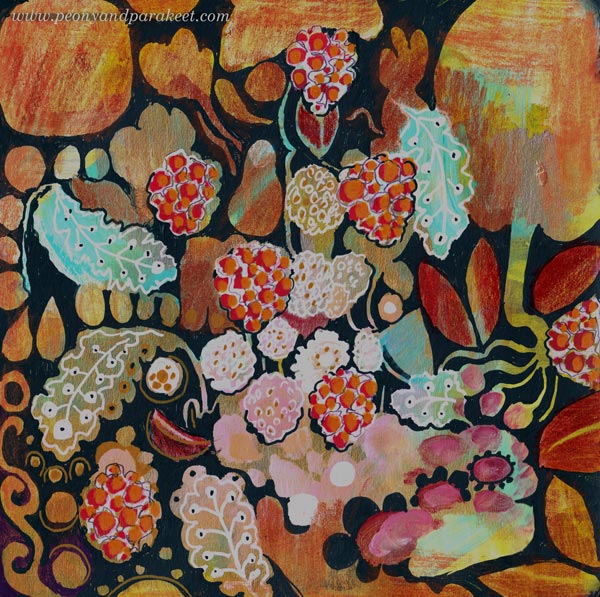
I wanted to make one banner that has fall and thanksgiving themes with berries. The page became a bit busy, but again, the banner is ok, I think!
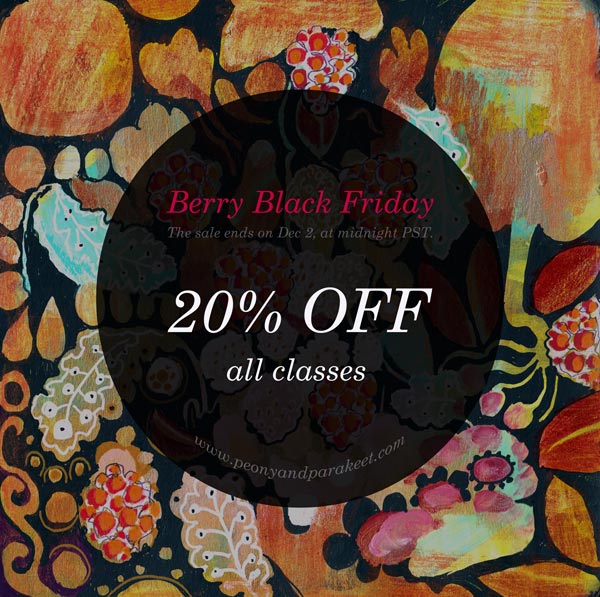
And now: it’s time to shop the sale!
The Black Berry Friday sale ends on Dec 2, 2024, at midnight PST.
Art On the Wall – Displaying Canvas Paintings
Our home is full of art. Almost all my canvas paintings are displayed on the walls. The arrangements change when old ones are sold and new ones are born. In this blog post, I show some of the paintings and how they are displayed at the moment.
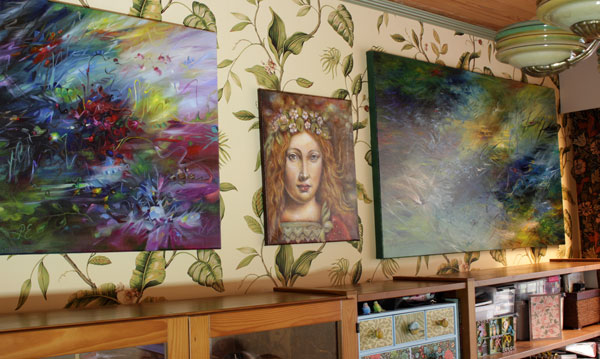
When using stretched canvases, framing is not necessary. I hope this inspires you to create some canvas art. Check out my acrylic painting course Floral Freedom and see more of my paintings at paivieerola.com/gallery!
In the Gallery Corner
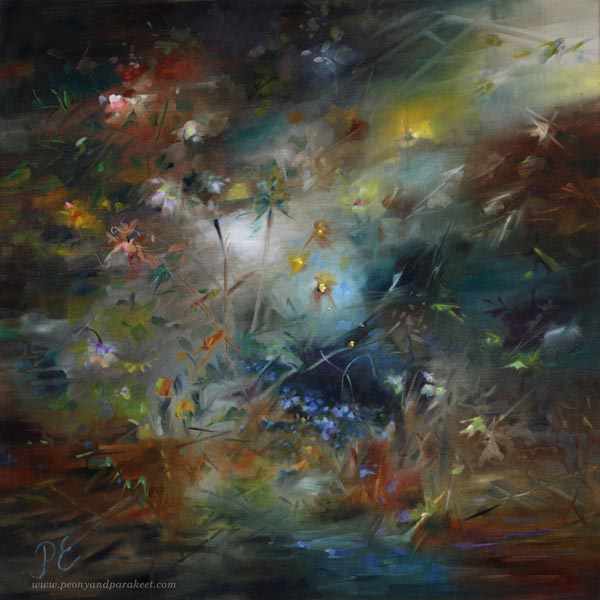
Our library room is on the darker side of our house, but I think that the lack of daylight and a heavy atmosphere goes well with the books and nostalgic-style paintings.
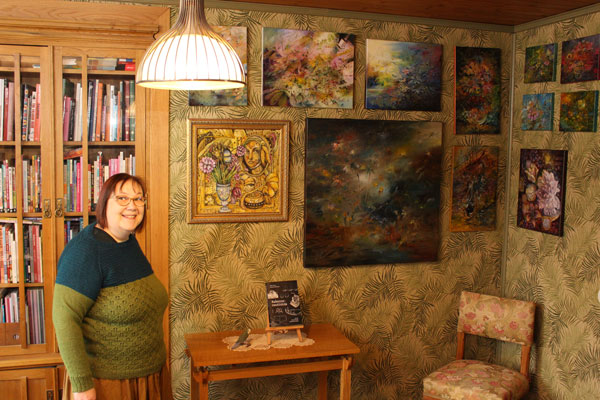
Displaying different sizes of canvas paintings on the same wall looks great but needs planning. I made a plan in Photoshop first, and then we hung them all at once.
Above the Aquarium
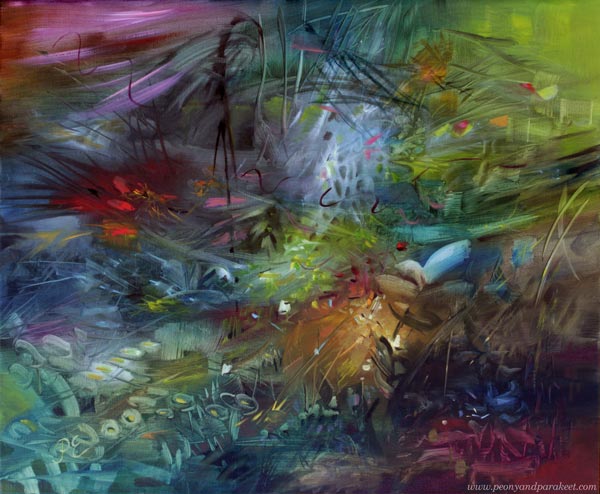
People often say that all my canvas paintings express the underwater world. That hasn’t been intentional because I am actually afraid of deep waters. But my husband has had aquariums for decades, and they must have affected my art.
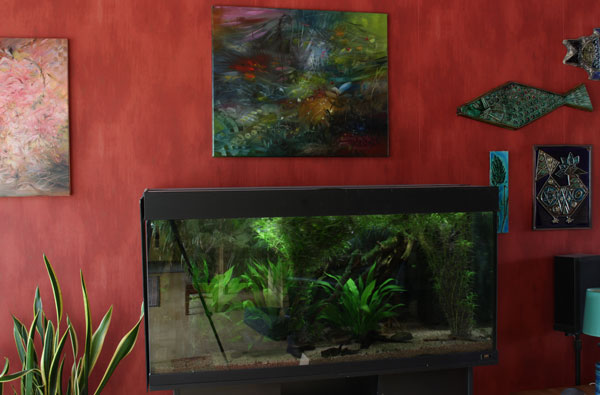
The painting continues the aquarium view. And it was not planned at all!
Best Lit
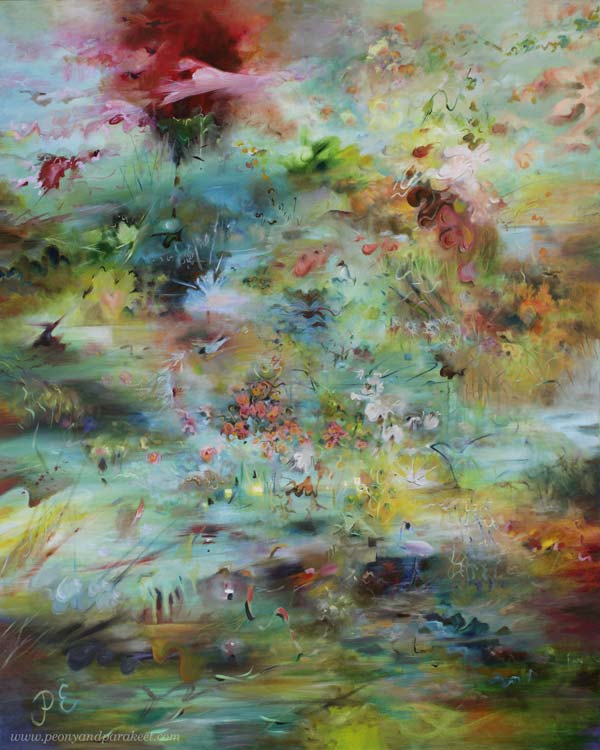
Our dining area has special lighting for a big painting – LED strips in two directions that have adjustable color and intensity.
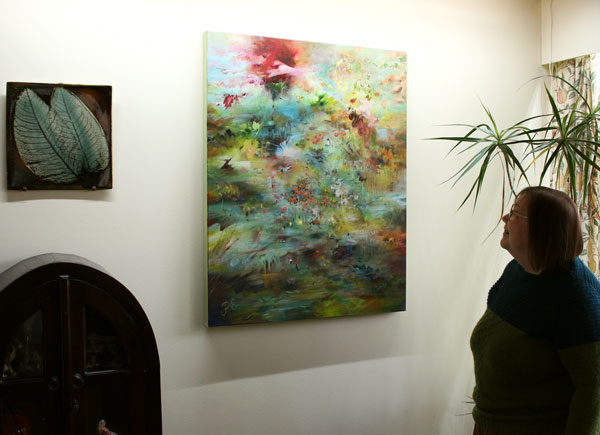
The colors of any painting are highly affected by the amount and color of light.
When I Wake Up
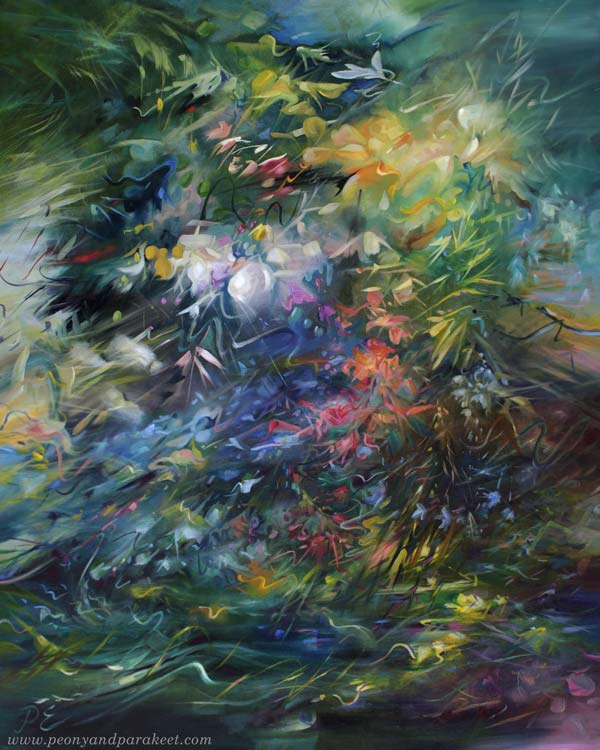
The bedroom is our darkest room, but every morning when I wake up, I look at the wall that is filled with my paintings.
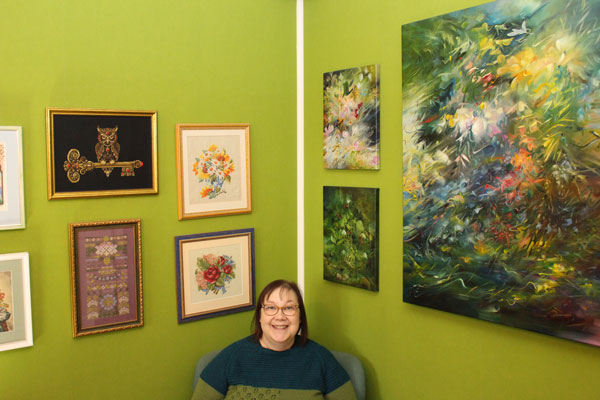
There is also a collection of my cross-stitch projects. Stitching is just a hobby but I like the combination.
In the Hallway Gallery
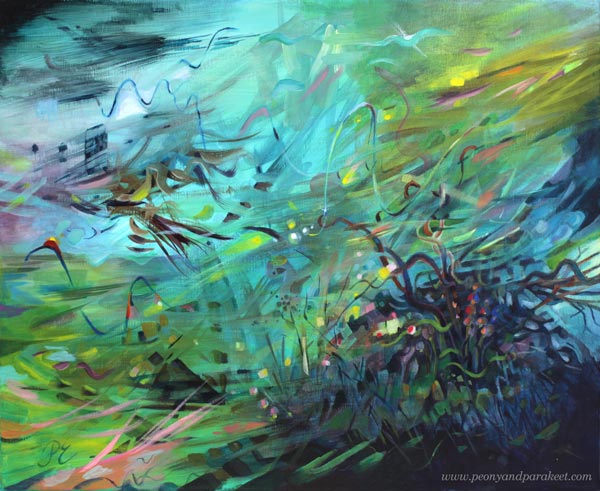
I love our yellow hallway and how the color unifies a mixed collection of paintings. Displaying canvas paintings can be this easy!
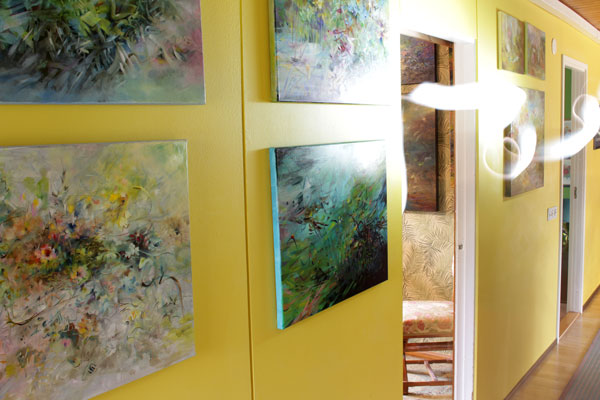
This narrow hallway was super boring before we painted it and added art on the walls.
Entrance Art
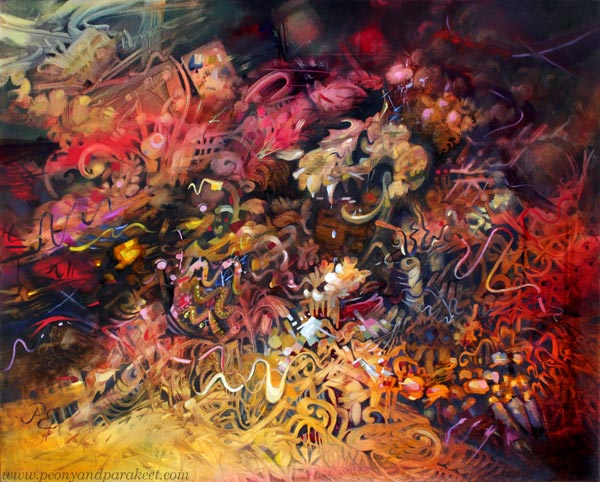
Our house has a space right after the entrance where I often change a painting to one that feels current. I also decorate the top of the sideboard cabinet that’s under the painting. Now it’s time for some darker art.
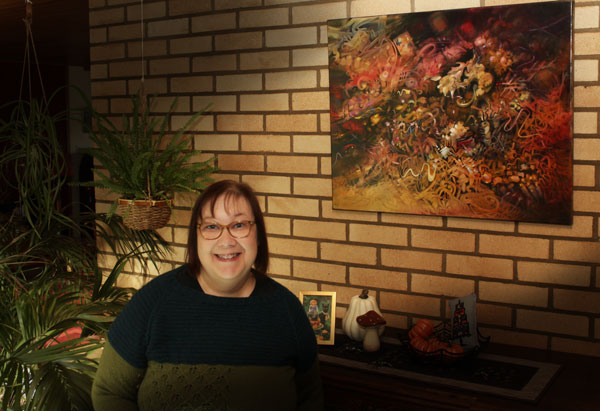
Happy Halloween!